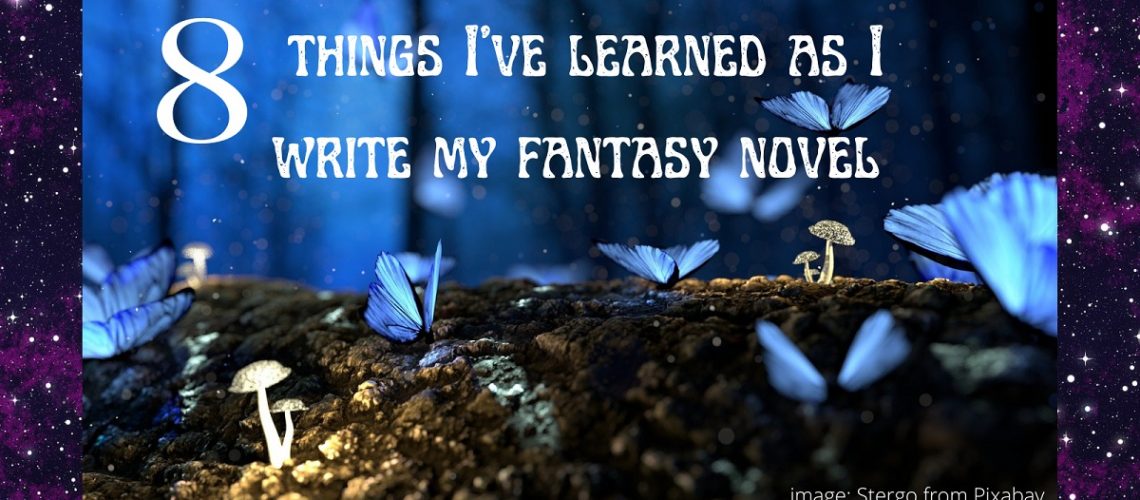When I read epic fantasy novels, years ago, such as J.R.R. Tolkien’s Lord of the Rings and The Hobbit, Stephen R Donaldson’s The Chronicles of Thomas Covenant and J.K. Rowling’s Harry Potter it never occurred to me that I might even consider writing about a world such as theirs. Then, the novels of Sarah J. Maas and Maria V. Snyder added fuel to the fire within.
I started writing with only the barest idea of how to write a fantasy novel by drawing on the books I had read, for guidance. Then, I decided I should get a proper insight into what is needed to write a fantasy novel. So, I bought books on the subject, did the Fantasy, Sci-fi and More course through the Australian Writers Centre, sat in on YA Fantasy panels at the Sydney Writers festivals and recently started listening to podcasts that covered the topic. Let me share what I have learned thus far.
8 things to consider before writing a fantasy novel.

#1 – Spend some time on the World Building
Whether you’re a pantser or plotter, it’s handy to have some idea of where your story will take place. Are there villages, towns, cities, mountain villages, forest dwellings and so on in your world? Harry Potter, for example, takes place at the Hogwarts School of Wizardry, Diagon Alley, London and 8 Privet Drive, Surry (and more).
Adrian Tchaikovsky, best known for his series the Shadow of the Apt and his novel Children of Time told Richie Billing on the recent episode of The Fantasy Writer’s Toolshed, that he spends weeks building his worlds.
#2 – Think about who will inhabitant your world.
Humans? Magical creatures? Non-human characters or folklore creatures? How do they interact? Is there conflict, or is it a peaceful existence?
#3 – Get down to the nitty gritty of your fantasy world.

As Pamela Freeman* so nicely put it – know what happens to the poo. Seriously, I had already mentioned the issue of toilets in my story, but now I know I need to elaborate. What happens to their poo? Do they chuck it out of the window into the streets below? Do they use it as fertiliser on crops that feed the village? See what I mean? Aside from poo, how does the world/town/ land work? Think about your societies – how they live and what jobs they do. Is there a hierarchy, matriarchy or patriarchy and social classes?
#4 – Consider how the Magic works in your Fantasy novel.
Who can use the magic? Is it taught and if so, where? Are there rules when using magic? Is there good and evil magic? Is it innate? And this is, I think, the most important consideration – when magic is used, is there a consequence? What is the cost of magic? For example, in Neil Gaiman’s Stardust, when Lamia the witch performs magic, her magical young body loses its youth.
#5 – Build a Map
When your characters begin their quest, you need to be reassured they won’t fall off the edge of the world when in fact, you were sending them to the snow-topped mountains. Also consider the topography such as rivers, mountains when placing your townships/villages. There are a couple of map-building websites such as Inkarnate and Wonderdraft that can help you with that. I based mine on the map of Cornwall and played with it a little. Then I couldn’t resist and drew something more elaborate just for fun, using photoshop.
Something to keep in mind – if you are hoping to be traditionally published, the publisher will organise someone to create an elaborate map for your book. But if you intend to Indie publish then you will need to create it yourself.
#6 – Create a cool backstory for your Characters
Of course, the protagonist and antagonist need a backstory but it doesn’t hurt to have a back story or family history for the secondary characters. It helps to build friendships and create tension among the friends as they embark on their quest. The whole backstory doesn’t have to be for the reader, but use it to develop a better understanding of your characters.
#7 – Be Mean to your Protagonist
Another cool tip from Pamela and other authors – do bad things to your character – be really mean. Give her something bad from which she can recover. It is necessary to build tension. Perhaps a hardship from her childhood haunts her and creates self-doubt about her ability to live up to expectations. What do other people think about her? Do they scoff when she fails and doubt her abilities? Back to Harry Potter – he survived Voldemort’s attack as a baby and in some circles, he is expected for greatness. But he wonders if he is destined for evil because of the sorting hat’s original choice for him.
#8 – Series or Stand-alone?
A series can be a collection of individual stand-alone books related to the main subject or a continuing plot line with the same main character. Stand-alone fantasy novels are also acceptable. My understanding is to have at least an outline ready for the follow-up books if you are considering a series and want to pitch your first novel.
****
I hope these 8 tips help you as much as they helped me. My favourites are Map Building and Be Mean to my Character – Mwahahaa. I am yet to finish my fantasy novel The Messenger (working title) the first in a series, yet to be titled and I appreciate it when published authors share their secrets about their writing process. And the great thing about these tips is they can be applied to most genres because after all, every novel is a new world.
Thank you for reading my article, stay safe everyone.
*Pamela Freeman is an Australian author of books for both adults and children. Most of her work is fantasy but she has also written mystery stories, science fiction, family dramas and non-fiction. Her first adult series, the Castings Trilogy (Blood Ties, Deep Water and Full Circle) is published globally by Orbit Books. She is best known in Australia for the junior novel Victor’s Quest and an associated series, the Floramonde books, and for The Black Dress: Mary MacKillop’s Early Years, which won the NSW Premier’s History Prize in 2006. She is also a writer and presenter of many courses, including the Fantasy, Sci-fi and More course for the Australian Writers Centre.
*To keep up with my articles, and what I’m doing or reading, please follow my posts or let’s connect on Facebook, Instagram, or Twitter.
If you like this article please share it.
*All links not my own are unsponsored. Pamela Freeman

